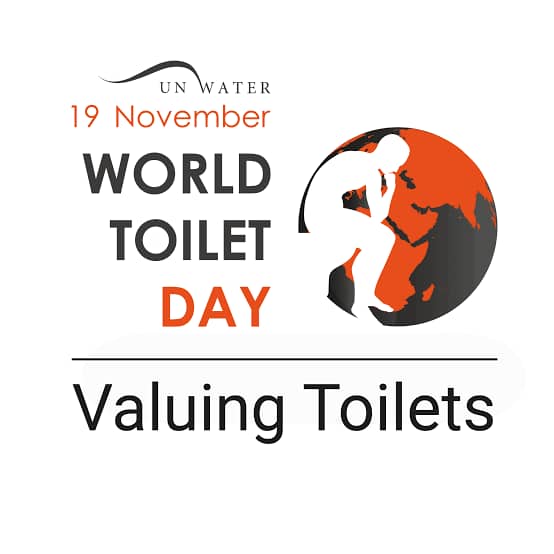World Toilet Day: The global sanitation crisis, a gloomy picture of the urban environment, by Sulaiman Ahmad Muhammad
In Nigeria, about 112 million people (56%) are without access to decent toilets, while 46 million people (23%) practice open defecation; this sanitation situation is very gloomy and the figures are very alarming.
The World Toilet Day (WTD); previously World Sanitation Day, is an official day set aside by the United Nations to inspire action to deal with the global sanitation crisis.
READ ALSO: World Toilet Day: NGO moves against open defecation in Taraba
It was first observed about two decades ago, precisely on 19th November 2001 by the famous World Toilet Organization (WTO), a Singapore-based non-governmental organization (NGO) founded by a philanthropist called Jack Sim.
However, in 2013 during the 67th session of the United Nations General Assembly in New York, Singapore’s government in collaboration with the World Toilet Organization presented a resolution “Sanitation for All” before the congress which was adopted by 122 countries.
Eventually, during that session, 19th November was officially declared by UN General Assembly a day to be celebrated annually as world toilet day and a special theme is chosen for each year.
The 2021 WTD’s theme is “Valuing Toilet”
Significance of the WTD
Achieving safely managed sanitation for all and ending open defecation by the year 2030 is the ultimate focus of the ambitious Sustainable Development Goals (SDGs) Target 6.2. World toilet day is an international observance day to inform, advocate, and inspire people to take action towards achieving this goal.
The day is celebrated annually in an awareness campaign mode beyond just toilet provision, rather on a broader sanitation context by the UN elites, international organizations, local civil society organizations and volunteers.
It was through the effort of WTO and Sustainable Sanitation Alliance (SuSanA) in 2007 that bolster the official declaration of sanitation in 2010 by the UN as a human right.
Global sanitation challenges
Sanitation is, simply put, “the hygienic process of separating human excreta from human contact”.
This means that human excreta should be adequately and safely managed along the entire sanitation service chain, i.e. from the point of production (toilet) through to the point of disposal or end-use.
Evidently, statistics have shown that globally, 4.2 billion people (55%) lack access to safely managed sanitation, 2.6 billion people do not have basic sanitation, 600 million people share a toilet or latrine with other households and around 673 million people defecate in the open.
In Nigeria, about 112 million people (56%) are without access to decent toilets, while 46 million people (23%) practice open defecation; this sanitation situation is very gloomy and the figures are very alarming.
The consequential implications of this unsafe and poor sanitation practice are detrimental to the environment, human health and the economy. Poor sanitation practice leads to a pervasive negative impact on the environment especially surface water quality, worldwide about 1.8 billion people are estimated to use a source of drinking water that is faecally contaminated.
On public health, faecally contaminated water contains pathogenic microorganisms that spread waterborne diseases such as typhoid, cholera, amoebic dysentery, schistosomiasis, among others; thus, causing an estimated 1.6 million deaths annually (4,500 people die daily).
Economically, the total costs of poorly managed sanitation are estimated at US$260 billion annually on a global scale.
The way forward
The challenges are all over, but the negative impacts of poor sanitation practice are far much felt in the urban environment where rapid population growth is on the rise and changes in demographics is occurring especially in the unplanned and outward expanded areas.
Ultimately, the threshold capacity of many urban environments in terms of service delivery has far been exceeded by the mounting pressure of this ever-increasing population; consequently, presenting a bottleneck to the authorities who often struggle to meet the demand for essential services created by rapid urbanization such as sanitation, water supply and other essential basic services.
Stimulated by the aforementioned, I urge the government (federal, states and local) in Nigeria particularly the northern part, development partners, international organizations, local civil society organizations, private organizations, philanthropists, academics, professionals and other well-meaning Nigerians to join hands together and rise up to the challenge of the sanitation crisis.
For example, special priority should be accorded to the marginalized people in the society who lacks access to safely managed sanitation (decent toilets) and hygiene facilities, in this note, I singled out the Qur’anic schools (Tsangayu).
It is evident that a particular ‘Tsangaya’ may have well over 200 almajiris (students), but with grossly underserved toilet facilities, in most cases, they may none or in rare situations, they may have only one and it’s poorly managed, thus open defecation among this group of people becomes the norm.
Moreover, accolades should be given to a very important group, yet discriminated against members of the society.
These are sanitation workers who are working assiduously to provide essential services in conditions that are detrimental to their lives, injurious to their health, in violation of their rights and safety and in compromised to their dignity to fill the large vacuum created between the grossly deficient sanitation infrastructure and service delivery.
In the end, it is evident that everybody wants to live in a clean and healthy environment because a successful urban is one where all its inhabitants live productive, healthy and dignified lives in an environment free from faecal contamination.
Without concerted efforts by all, the ambition of achieving the Sustainable Development Goals (SDGs) Target 6.2 will only be a daydream; never will it be actualised as much anticipated.
Sulaiman Ahmad Muhammad is a Lecturer/WASH Consultant at the Department of Science, School of Continuing Education, Bayero University, Kano and can be reached via email: sman4rahma@gmail.com
Follow the Neptune Prime channel on WhatsApp: https://whatsapp.com/channel/0029Va74ZvU2v1IqKByXoX3d
Do you have breaking news, interview request, opinion, suggestion, or want your event covered? Email us at neptuneprime2233@gmail.com


